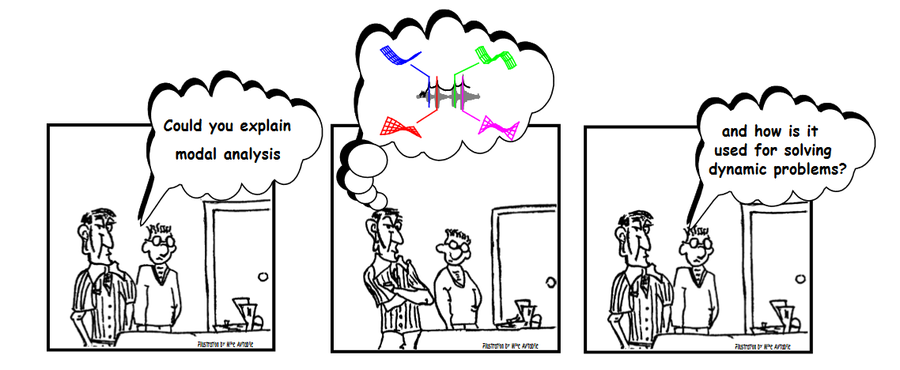Modal Theorical FAQ
 ==General
What is modal analysis?.
==General
What is modal analysis?.
Common mistakes.
Acquisition
Generality
basic steps to acquire data Can the test setup have an effect on the measured modal data ? Do the setup boundary conditions and accelerometers have an effect? How many points are enough when running a modal test is it better to collect averaged FRF data for a modal test? Or collect time data and process it afterwards? We talked about the number of points needed for a modal test before.
Sensor and reference
I ran one test with an x-excitation and can see some modes and another test with a y-excitation and see some different modes could I use an oblique angle instead ?
Do I need to have an accelerometer mounted in the X, Y and Z directions to do a modal test?
Is there a difference between a roving hammer and roving accelerometer test?
Someone told me that you must have multiple references to identify pseudo repeated.
Is there any benefit to using multiple references?I thought only one reference was need.
Should I always use a hard tip for impact testing . . .so the input spectrum is flat over all frequencies
Other
double impact question
Shacker
Is there any difference between a modal test with a shaker excitation or impact excitation? Is there any real advantage to MIMO testing? Why not just use SISO and then move the shaker?
results interpretation.
Modal theorical
Windowing
When impact testing, can the use of the exponential window cause any problems? Which window is most appropriate for the various types of modal tests performed? I heard someone say Pete doesn't do windows. Whets the scoop.
Curvfitting
Curvefitting is so confusing to me! What's the difference between local and global curvefitting ? I still don't understand curvefitting ...
others questions
What's the difference between a complex mode and a real normal mode? Could you explain the difference between time domain, frequency domain and modal space? I ran a modal test on a portion of a structure of concern and many modes look the same! Someone told me SDM will never work Are you sure you can get mode shapes from one row or column of the H matrix?
I hear about SVD all the time Could you explain it simply to me?
I'am still overwhelmed by all this modal stuff Laplace, Fourier, FRFs, and all that!
Does it make any sense to use the actual operating loads as the excitation force for a modal test if the force is a random signal ?
Why is calibration and mode shape scaling important? And does it make a difference?
Why is mass loading and data consistencyimportant for modal parameter estimation?
Should I use all collected measurements when estimating modal parameters ?
Why do some measurements have anti-resonances and others not ?